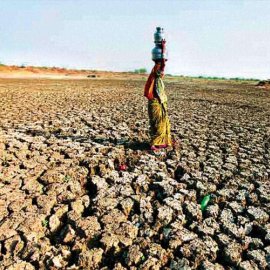The Coming Collapse of World Water
-
English
-
ListenPause
[intro music] Welcome to World Ocean Radio… I’m Peter Neill, Director of the World Ocean Observatory. “Water, water, everywhere, and not a drop to drink.” I come back to this familiar line from “The Rime of the Ancient Mariner” by Samuel Coleridge because it so desperately expresses the dilemma faced by people the world over with the crisis faced in the collapse of fresh water supply everywhere. It is no distant problem. It is all around us, even in places we think are “water rich,” places on the ocean with watersheds and rivers that have formed and sustained local settlement and culture for generations, places like where I live today. The negative forces are well known: fossil fuel emissions, climate change, temperature rise, extreme weather, drought, deforestation, erosion, pollution, and unrestrained consumption by burgeoning population that does not expect water limits or exhaustion, does not conserve water resources, does not see the connection between available water and human health, or stands by to watch commodification and privatization of water under ever-increasing corporate control. It will never happen here, they say, until it does. Consider some startling facts. Today, over 17 countries are under high water stress, one fourth of the world’s population facing running out of water. A recent World Resources Institute report lists the major world cities: Sao Paul, Brazil; Chennai, India; Cape Town, South Africa; each of these have passed what is called “day zero,” when all the water in the behind the dams in the reservoirs is dry. A NY Times article describes certain conditions as follows: “Mexico’s capital, Mexico City, is drawing groundwater so fast that the city is literally sinking. Chaka, Bangladesh, relies so heavily on its ground water and its water-guzzling garment factories that it now draws water from aquifers hundreds of feet deep. Chennai’s thirsty residents, accustomed to relying on groundwater for years, are now finding there’s none left.” The Times continues that the “World Resource Institute researchers concluded that of the cities with more than 3 millions residents, 33 of them, with a combined population of 255 million, face extremely high water stress, now, with serious repercussions for public health and social unrest. By 2030, the number of cities…is expected to rise to 45 and include nearly 470 million people.” Perhaps such numbers are so large and incomprehensible that they are meaningless. But the world is already experiencing the movement of “climate refugees,” from places where water scarcity and failed agriculture force re-location to other places, a vast social upheaval that is evident in the desperate personal passages from the Middle East and Africa to Europe. And the disruption is evident in the United States as well: in the southwest where drought and water limits are more evident and disruptive than ever; in the south, particularly Florida, where aquifer loss, salt water intrusion in wells, and the inexorable shrinking of the Everglades, threatens metropolitan coastal cities with exhaustion. We have wildfires in drought-prone areas everywhere that cannot be extinguished because there is no water. What must be done? The problem is enormous, but can only be first solved by local action. Existing local supplies must be conserved. Commercial operations, such as fracking, that poison waterways must be prohibited; watershed must be preserved and restored, to include adjacent land protection, development restrictions, and regulatory enforcement. Infrastructure for sanitation and distribution has been allowed to deteriorate as a result of political indifference, restricted budgets, and corruption. Necessary capital is limited and inhibited by tax resistance, often targeted to other apparently more pressing needs. All this must change. What actually can be a more pressing issue than a water supply inadequate to basic human need for families and communities, than irresponsible policy and facilities for general health and sanitation, than in equitable distribution through the conflicting demands or agriculture, manufacturing, and public need. Water is the most valuable natural resources on earth. I’ve said it over and over again: we can live without oil and gas, without diamonds and chocolate, without most anything else, but we cannot live without the water essential to nurture our bodies and our souls, each day and forever. What will it take to understand that this cannot be any longer sublimated to profits and vested interests, to complacency and ignorance? What will it take for every one of us to realize that if we fail on land then we must succeed on the sea? It will be to the ocean that we will inevitably turn for water to sustain our millions, the billions of our total world population, into the coming years, decades, and generations. We have the wealth, we have the technology, but when will we find the political will? Until it is too late, and there is not a drop to drink? We will discuss these issues, and more, in future editions of World Ocean Radio. [outro music]
Increasingly, people around the world are experiencing a fresh water crisis. More than 17 countries are under high water stress, and one fourth of the world's population faces running out of water. In this episode of World Ocean Radio we discuss the ramifications of continued and increased disruption if we cannot solve the water supply crisis through local action, conservation, protection, infrastructure improvements, and regulatory enforcement.
Do you prefer the written word? Head on over to Medium.com/@TheW2O.
About World Ocean Radio
World Ocean Radio is a weekly series of five-minute audio essays available for syndicated use at no cost by college and community radio stations worldwide. Peter Neill, Director of the World Ocean Observatory and host of World Ocean Radio, provides coverage of a broad spectrum of ocean issues from science and education to advocacy and exemplary projects.
Image
Chennai India. Wikimedia Commons
- Login to post comments



